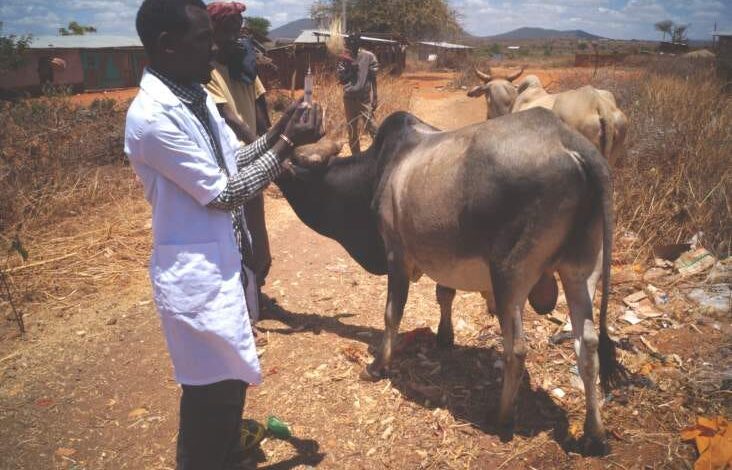At least 300 livestock keepers from four ASAL counties are set to benefit from a farmers’ field school.
This will be implemented under USAID’s Local Works programme called ‘Ufugaji Bora Mashinani’.
The three-year programme is being implemented by the Northern Rangelands Trust (NRT) that supports 43 community conservancies in Kenya and Uganda.
Dr Wario Sake, NRT Trading’s Livestock Director said the programme seeks to empower and build the capacity of livestock herders in 10 selected conservancies in four counties of Isiolo, Samburu, Laikipia and Marsabit.
NRT Trading is a business accelerator for social and conservation impact enterprises.
He spoke while visiting the Laramatak livestock group at Sera Community Conservancy in Samburu county.
Sake said the programme encompasses a farmers’ field school approach (FFS) and will provide training targeted at enhancing livestock productivity.
This is in addition to building capacity of the livestock keepers and developing the livestock value chain to increase household income.
He said the training is informed by a baseline report from a survey conducted in August 2021. The survey revealed practical skill gaps among herders as an impediment to profitable livestock production.
According to the United Nations’ Food and Agriculture Organisation (FAO), more than 600 million of the world’s poorest households rely significantly on livestock as a key source of income.
For decades, the value of livestock production has expanded enormously, to date, it is providing livelihoods for one to eight people in every household.
As the world faces climate change issues, sustainable livestock production has become critical to economic development and ensuring a healthy future.
He said the training is carried out by utilising curriculum and training materials approved by the livestock departments of all the beneficiary counties.
At least 300 herders were targeted in 10 clusters for modular training in livestock breeding and feeding, animal health and livestock markets, nutrition, climate change, leadership and governance.
“These training and sensitisation have resulted in pastoralist groups becoming powerful champions for the development of the livestock value chain through resource mobilisation and development planning participation,” he said.
The trained herders have since registered as formal groups within their respective clusters and counties.
“Their participation in resource planning, through linkages with local institutions and leaders, portends as the greatest opportunity to put their gained skills to proper use,” he said.
In Samburu county, the Ufugaji Bora Mashinani livestock cluster of Sereolipi Conservancy registered an association under the name Laramatak Livestock Group.
Alex Lekisaat, the chairperson of the certified livestock group, said the activities and the participation of the group in the livestock value chain attracted the attention of the stakeholders in the landscape.
He said the group was identified for support by the Community Driven Development Committee (CDDC) for the Emergency Locust Response Programme.
Lekisaat said they were provided with animal health input supplies including anti-anthelmintics, antibiotics, multivitamins, personal protection equipment (PPEs), knapsack sprayers, anti-inflammatories, and anti-protozoans.
These essential supplies will enable herders to ensure the health and well-being of their livestock, resulting in higher productivity and income.
“This programme is transformative and has provided livestock keepers with skills and knowledge. Consequently, it has opened the door for support and services from other stakeholders,” Lekisaat said.
Sake emphasised the importance of seeking the advice of animal health practitioners to ensure that drug administration is safe and effective for their livestock.
“It has been established that the training beneficiaries are undertaking best practices ranging from breed improvement, access to quality animal production and health inputs. This is in addition to group marketing of livestock and their products, pasture production and preservation, as well as taking up leadership roles in governance in the landscape,” Sake said.
This has been done through weekly digital reporting by the cluster leaders, monitoring visits by monitoring and evaluation team, and regular progress assessment by livestock technical team.
He also pledged NRT Trading’s continuous support in providing critical technical assistance throughout the life project.



